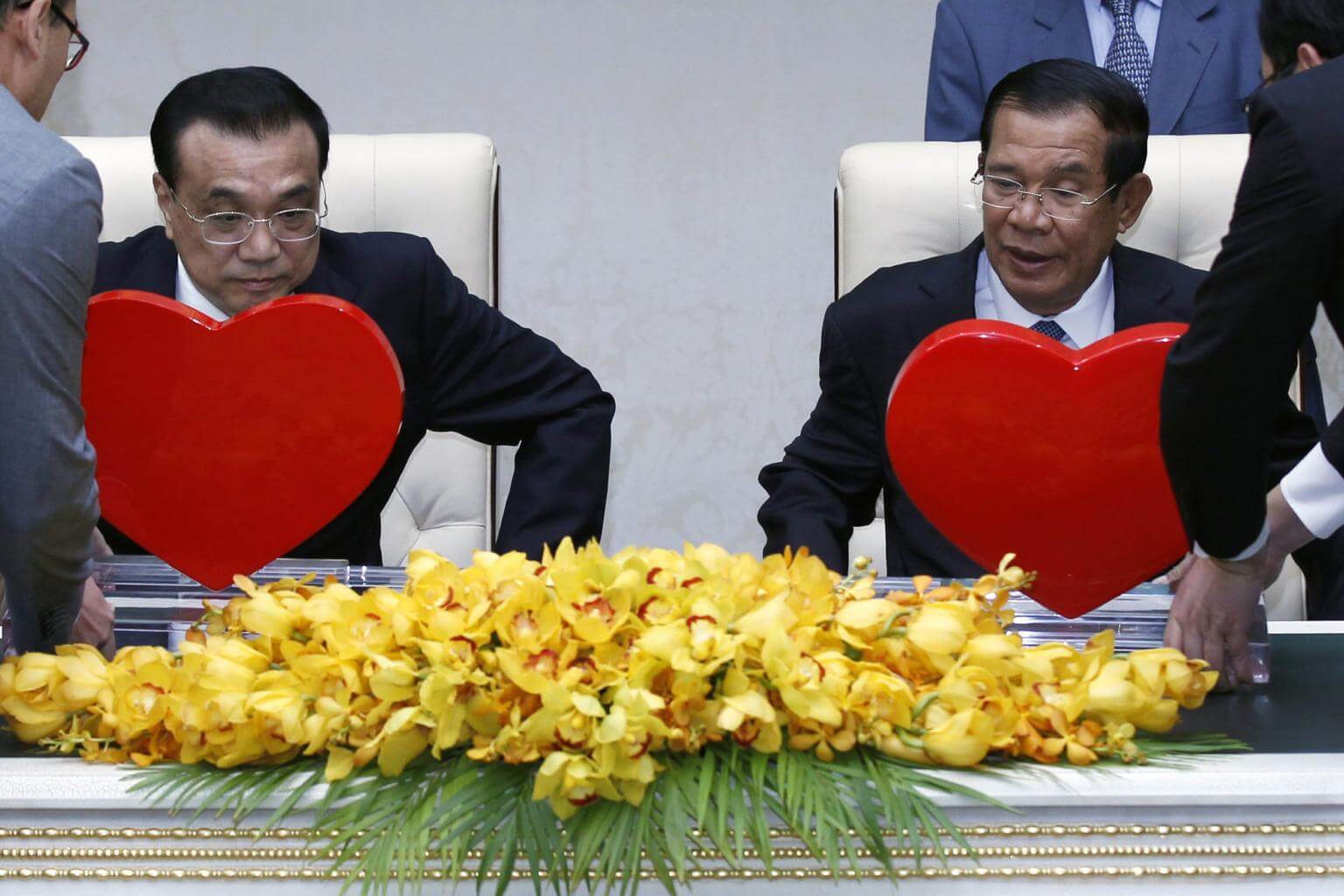China’s Li courts Cambodia with new deals
Sign up now: Get insights on Asia's fast-moving developments

Cambodian officials hand over hearts to Chinese Prime Minister Li Keqiang and Cambodian Prime Minister Hun Sen during a signing ceremony at the Peace Palace in Phnom Penh on Jan 11, 2018.
PHOTO: EPA-EFE
Follow topic:
BANGKOK - Chinese premier Li Keqiang reaffirmed close ties with Cambodia on Thursday (Jan 11), overseeing the signing of deals that will deepen China's already large imprint on the South-east Asian nation.
During his official visit in Phnom Penh, both sides inked agreements for Chinese loans for electricity and roadworks in Cambodia. Another deal involved Chinese financing for a new airport.
China Communications Construction will build an expressway some 200km in length linking the capital Phnom Penh to Sihanoukville, a coastal city that has attracted strong Chinese investment.
Cambodia's Royal Group of Companies and China Great Wall Industry Corporation will also launch Cambodia's first satellite, according to a Reuters report.
Mr Li also told Cambodian premier Hun Sen that China had another aid pledge of more than 1.2 billion yuan (S$246 million) for other projects, according to Mr Eang Sophalleth, an aide to Mr Hun Sen.
Meanwhile, both countries pledged to deepen cooperation in agriculture, and grow bilateral trade to US$6 billion (S$8 billion) in 2020. China is Cambodia's biggest source of aid, investment and imports.
In a joint communique issued after the visit, China "reiterated its respect for the independence, sovereignty and territorial integrity of Cambodia, and reaffirmed its support to the Cambodian people in selecting a development path which suits their national conditions".
Both countries also agreed to try to align Cambodia's development strategy with China's Belt and Road Initiative, an ambitious infrastructure plan to tighten the links between Beijing and regional economies.
Within consensus-based Asean, Cambodia has been known to support China's position by blocking mention of an international tribunal ruling on the South China Sea, a large part of which China claims.
China, in turn, has voiced support for Phnom Penh in recent months amid Western criticism of Mr Hun Sen's crackdown on the political opposition.
Both Mr Li and Mr Hun Sen were co-chairs of the recently concluded Lancang-Mekong Cooperation leaders summit, a China-backed platform to promote coordination among the six riparian countries of the key South-east Asian river.
Trust between the leaders of both countries runs deep, notes Dr Chheang Vannarith, an associate fellow at ISEAS-Yusof Ishak Institute. In December, Chinese president Xi Jinping reportedly called Mr Hun Sen a good friend, old friend and true friend of the Chinese communist party and the Chinese people.
Cambodia, as an Asean member and a Mekong country with membership of groups like the Greater Mekong Subregion, plays "a major role in these regional and sub-regional organisations, and is therefore important in China's strategic interest," Dr Deth Sok Udom, a Phnom Penh-based associate professor of international relations, told The Straits Times.
"Depending on the issues, China can choose to keep certain issues divisive among Asean members," he said. "But at the same time it could also push for more connectivity among Asean countries, such as through the infrastructure connectivity among the Mekong countries as part of the larger Belt and Road Initiative."
During the Lancang-Mekong Cooperation summit on Wednesday, Mr Li told leaders of Thailand, Cambodia, Vietnam, Myanmar and Laos that China encouraged companies to build hydropower stations, reservoirs, and irrigation and drinking-water projects in the region.
According to a report by Xinhua news agency, Mr Li also urged his counterparts to enhance connectivity and push for the construction of cross-border economic and trade cooperation zones.

